24 Top Tips to Succeed in a Zoom Interview

Attending a zoom interview? Employers may increasingly use video conferencing software to conduct interviews. Because it is more convenient for distant employment or initial screening interviews, this is the case. Because this is a different sort of interview than a typical in-person interview, it's necessary to think about a few things. In this post, we'll go through 18 ideas for preparing for your Zoom interview.
What's a zoom interview?
When you use Zoom to interview for a job, this is known as an interview Zoom call. Many businesses utilize Zoom, a form of video software, to communicate with people remotely. It comes with a number of features, including screen sharing, text chat, video recording, and muting. You can utilize these tools to your advantage during your next video interview if you've learned how to use them effectively.
Tips for succeeding in your zoom interview
Here are the best tips for succeeding in upcoming zoom interviews and general interview tips.
Make use of the mute button
Zoom features a function that allows you to silence your audio. This is a useful tool to have on hand when your interviewer is speaking for extended periods of time. They won't be able to hear anything from you if you use the mute button. When there are loud sounds in your home, such as dogs barking or children playing, this is beneficial. Keeping your phone on silent while they talk might assist your interviewer concentrate on what they're trying to say.
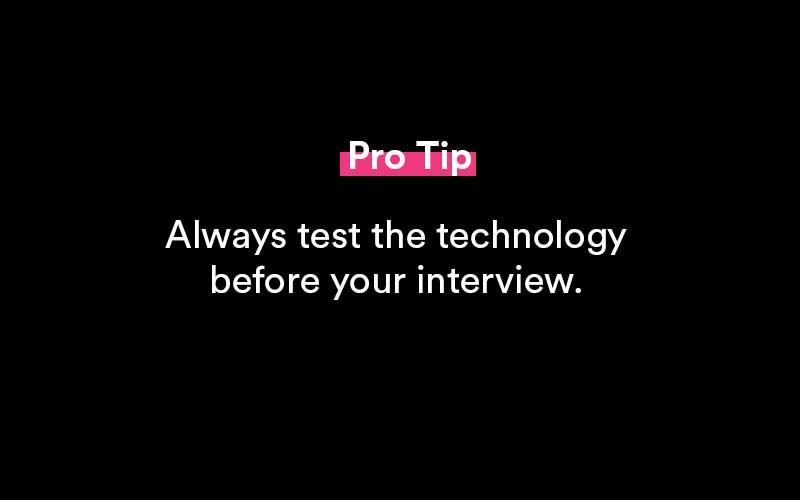
While speaking, look into the camera
Maintaining eye contact with your interviewer during an in-person interview is a show of confidence and respect. This is a little different with video chat since if you look them in the eyes on your screen, it may not appear that way on their end. Instead, while speaking, look at the camera. This gives the impression that you're gazing at them instead of at yourself or at the screen.
Select a professional history
When setting up your computer, pick a spot that is clean and clutter-free. Make sure your background is simple rather than cluttered, and that it only contains professional-looking objects. Setting up in front of a blank wall or with a few modest decorations demonstrates that you are well-organized and pay attention to the smallest details.
Look for a place with enough of light
During your Zoom interview, your interviewer must be able to observe your body language and facial emotions. Choose a room with adequate illumination so that people can see you well. Setting up your interview area in front of a window that allows in a lot of natural light is a wonderful approach to stand out. Setting up in front of a window will cast shadows on your face, making you appear to be a silhouette.
Choose a peaceful location
Select a location that is both peaceful and devoid of distractions. This allows your interviewer to focus entirely on what you have to say. An interview should take place in a room where you may close the door. Close your windows and turn off your music or television to reduce extraneous noises.
Turn off your phone
Silence your phone and put it away before your Zoom interview. You may concentrate on the interview rather than a text message or a phone call this way. It's a good idea to put your phone away for a few minutes before your interview so you can clear your thoughts and concentrate on preparation.
Maintain your concentration
Maintain your gaze on the screen as your interviewer speaks. Show them that you are paying attention to what they have to say by active listening, just like you would in an in-person interview. You may accomplish this by repeating what they say, nodding in agreement, and asking follow-up questions.
Disable notifications
You should also turn off all notifications on your PC in addition to shutting off your phone. Close out of any social networking sites or anything else that could cause you to become distracted. Set the Zoom conference to full screen so that you can only see your interviewer.
Make use of a laptop or a computer
Although Zoom offers a mobile app, it is recommended that you use it on a desktop or laptop computer. Holding your phone in your hand might produce camera shaking, but placing your computer on a table gives a more steady view of yourself. Your computer camera also provides a better picture of yourself to the interviewer and tends to come in crisper.
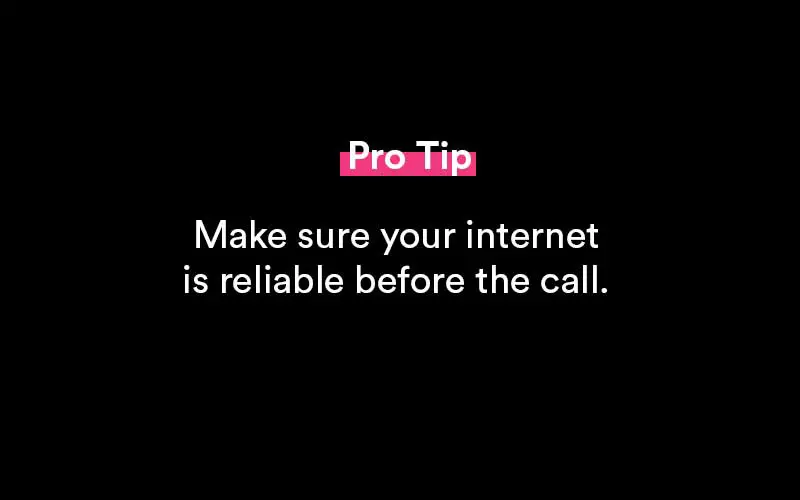
Your laptop should be charged
If your interview location does not have an outlet, ensure sure your laptop is fully charged before you go. You should ideally select a location where you can leave your laptop plugged in for the duration of the interview. This manner, your gadget will survive for the duration of a long discussion.
Your PC should be updated
Before your meeting, download the most recent version of Zoom. Similarly, perform a thorough system upgrade on your computer well ahead of time. If you mistakenly click on the install update notice during your interview, your computer may restart in the middle of the conversation. You may guarantee that your gadget is at its optimum by performing these upgrades a few hours before the interview.
Locate a reliable internet connection
Make sure you have a solid internet connection before your Zoom interview. Test your connection in the location where you'll be sitting throughout your interview. You're more likely to establish a strong connection during your interview if you can stream video or Zoom with others.
Make contact with your family
If you live with others, inform them of your interview schedule and location. Remind them to give you room and keep the noise low until you've finished your interview just before it begins. It's ideal if individuals you live with stay in a different room from you so you can focus.
Dress professionally
Dress as though you were going to an in-person interview. This implies that you should dress up in your best business clothes. Dress pants, blazers, formal shirts, formal dresses, and modest skirts are all good choices. Wear good bottoms even if the interviewer can't see your legs to appear totally prepared and professional.
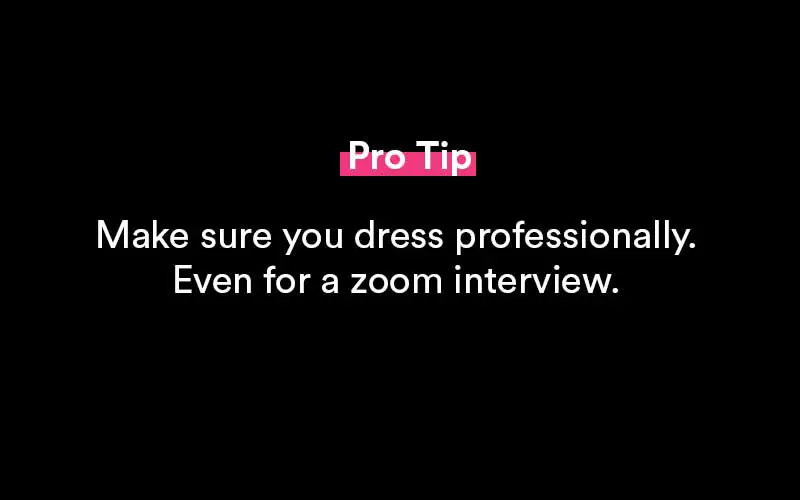
Keep your screen free of clutter
It's a good idea to shut out of everything on your desktop before your interview if you need to use the screen share option. This can also keep video or music from playing in the background unexpectedly. Closing all websites may also aid in the faster loading of your Zoom call.
Experiment with Zoom
Learn everything there is to know about Zoom. Video chats with friends and family are a great way to test out the program. You might even do a few fake interviews to get a feel for how this sort of interview is conducted. Have your friends and family ask you standard interview questions and then provide feedback.
Test your sound, camera, and general virtual environment in advance of interviewing with the company.
Use body language that is acceptable
The ability to see each other's body language is one advantage of video chat over a phone conversation. Sit up straight with your hands in your lap and your feet on the floor during your interview. If it's natural for you, you can use your hands while speaking. Use nonverbal signs like nodding and smiling to demonstrate that you're paying attention while your interviewer speaks.
Learn who the hiring manager is
Take time to learn who the hiring manager is. And who is going to be speaking with you on the phone or conducting the job interview? Learn what their role is. What they could be looking for in an ideal candidate. And spend the time to prepare the best questions to ask the interviewer in order to feel confident going into the interview and completing it.
Watch your facial expressions
Not only is it good to test your tech, but to test your facial expressions too. How do your facial expressions have an impact on the interviewer? Consider how being apart could have an impact on your ability to perform.
Do some research on the firm
The first step in any interview preparation is to do some research about the firm.
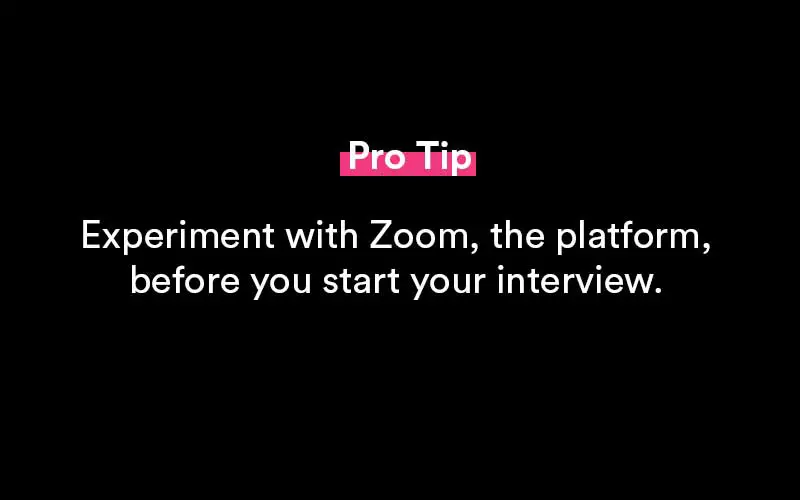
This is something you should have done before applying for the job. If you didn't, set aside some time before the call to examine the company's website to learn more about its products/services, beliefs, and culture.
It's critical to do your homework about the firm you're interviewing with to verify that you're a good fit. It also aids in the development of interview questions.
Make sure you're ready to respond and ask inquiries
The ability to effectively answer questions is the most crucial aspect of interviewing. You'll need to be able to explain your background and how it relates to the position you're interviewing for.
Employers frequently ask behavioral interview questions in order to learn more about your previous experiences. Your prior experiences and how you dealt with problems might help foretell how you would act in the future. This is how an employer assesses whether or not you are qualified for the position.
It takes a lot of practice to be able to properly respond to behavioral inquiries. Take some time to review typical behavioral interview questions before your interview.
Examine your CV for examples to back up your responses to each question. The STAR technique is a wonderful way to structure your responses to these questions.
After you've written down your responses to the frequent questions, practice them aloud in front of the mirror or with a partner.
Common mistakes to avoid
Tips to help ensure future job interviews over zoom go well.
Attending the interview late
If you're not on time for a job interview, you'll be late. This is especially true when it comes to Zoom interviews. If you go on the phone a few minutes early, you won't have to worry about last-minute technological issues derailing your efforts. Nothing is more stressful than going into a job interview anxious and preoccupied.
To ensure that you arrive on time and prepared, confirm your interview information before the day of your appointment.
Not practicing with the technology prior to using it
When it comes to technological issues, you can prevent a lot of them by making sure you're familiar with the program ahead of time. Before the big day, download Zoom and do at least one practice interview. You'll be more relaxed throughout the discussion and more robust if any technical difficulties arise.
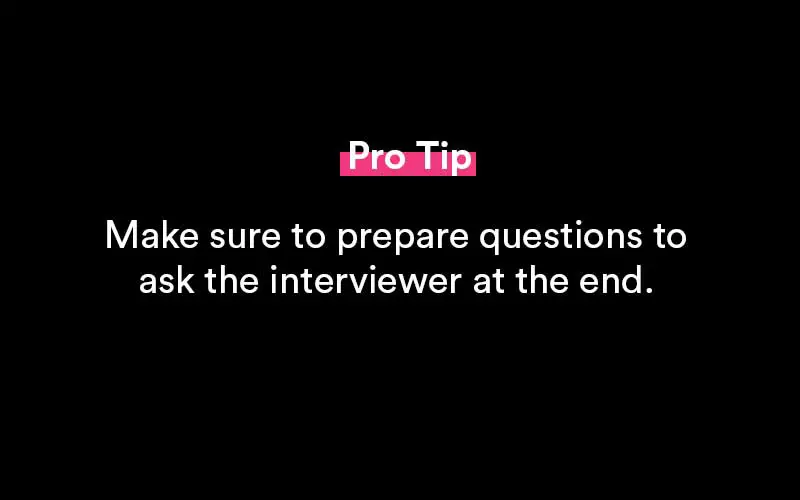
Forgetting to gather materials
You should be able to access everything you need to conduct a good interview once you're situated in front of your computer. Make sure you have all of your interview documents with you, such as your CV, references, and portfolio, and that you're comfortable and prepared to talk.
Wearing the wrong clothes
It may be difficult to recall what a business dress looks like if you've been spending a lot of time at home in sweatpants or pajamas. For a quick refresher, the best choice for job interviews is generally professional clothing or business casual clothes. Safe bets are a suit, sport coat, button-down, or good sweater. Try to match your attire to the company's culture as best you can, but even if employees wear casually, dress up a little.
Always keep in mind that anything you pick should look well on camera and be professional. Stripes, excessively bright colors, and wearing the same color as your background should all be avoided.
Conducting an interview in a messy environment
Even if you choose a digital background, it is always a good idea to clean up before your job interview. Why? According to studies, your work environment has an impact on your mental health and decision-making abilities. 2 In summary, a calm work environment improves mental well-being.
Make sure you're in a professional interview space in advance of interviewing.
Using these habits to distract the interviewer
The biggest Zoom interview error you can do is to show your disinterest in what the interviewer is saying by your conduct and gestures. Regrettably, this is much easy than you may imagine.
Little acts of kindness may have a tremendous impact. Fidgeting with your hair or clothes, checking your phone (even if it's off-screen), or gazing at yourself rather than engaging with the interviewer can all give the impression that you're disconnected or preoccupied.
Popular Resources

Featured
35+ Phone Interview Questions & Best Sample Answers
Phone interviews have become a core part of the process when attempting to find a secured placement for an open position. Companies receive massive responses from potential candidates for any..

Featured
12+ Best Questions To Ask A Recruiter
Concerning a job search, you might receive numerous offers from your recruiters. Before you choose one, you need to assess all the conditions, for which it is vital that you know everything associated with the offered position..

Featured
Answering "What Makes You Unique" In A Job Interview
Answering this question during a job interview requires more than knowing why you are unique as an individual. Yes, the true scientific answer is made up of two main components: your..

Featured
250+ Ice Breaker Questions for Life
An ice breaker question is a question that’s asked from one person to another person in order to act as a conversation starter. It brings a connection...

Featured
10 Best Answers to "What Motivates You?"
Open-ended questions like “What motivates you?” can elicit a deer-in-the-headlights reaction from job candidates if they are unprepared. It’s a broad question and can leave the interviewer..

Featured
Answering "How Did You Hear About This Position" In An Interview
A lot of interviewers ask this question - how did you hear about this position? This way they can judge you if you are a passive or an active job seeker..

Featured
8 Best Thank You Emails After an Interview (Samples, Free Templates)
Writing a thank you note after an interview says a lot about you as a potential employee. Most notably, it says that you care about the opportunities presented..

Featured
Writing a Resignation Letter (How To Write It, Samples)
Writing the perfect letter of resignation is more of an art than it is a science. And we’re going to cover how to master that art form in this full guide..

Featured
How to End a Letter (Example Salutations, Sign Off's)
Knowing how to end a business note or email is an important skill to develop. It helps portray a sense of confidence, respect and tone to your message..
